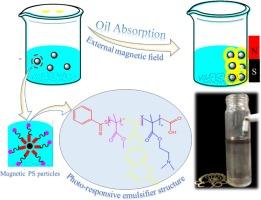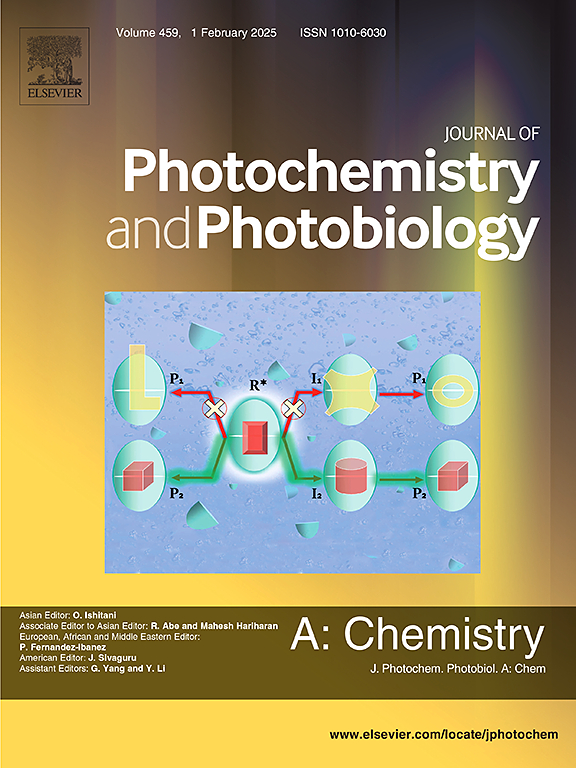利用光响应乳化剂通过乳液聚合合成磁性聚苯乙烯纳米复合材料,用于高效吸收原油
IF 4.1
3区 化学
Q2 CHEMISTRY, PHYSICAL
Journal of Photochemistry and Photobiology A-chemistry
Pub Date : 2024-10-18
DOI:10.1016/j.jphotochem.2024.116092
引用次数: 0
摘要
原油泄漏到水体中会严重威胁人类健康和海洋生物。为了有效清洁原油泄漏,我们创造了一种磁性聚苯乙烯(m-PS)纳米复合材料。磁性纳米粒子的使用使原油吸收更环保,因为它更容易利用外部磁场进行收集和回收。为了使 Fe3O4 纳米粒子与乳液聚合中使用的疏水性苯乙烯单体相容,采用了疏水表面改性反应对其进行处理。这种改变有助于聚苯乙烯(PS)链接枝到纳米粒子上,然后进行乳液聚合。作为乳化剂,一种含有香豆素的光响应两亲嵌段共聚物是通过可逆加成-断裂链转移聚合反应生成的。这样就能在紫外线刺激下调节乳化和反乳化。合成的 m-PS 纳米复合材料的原油吸收能力高达其自身重量的 2.31 倍,这表明它在原油泄漏清理方面具有很高的效率。与商用 P105 乳化剂相比,合成乳化剂的临界胶束浓度明显更低(分别为 0.0976 和 0.354 mg/mL),这表明它具有更高的效率并能减少对环境的影响。为了更透彻地理解所报告的结果,我们还评估了使用商业乳化剂和合成乳化剂生产的 PS 中的霍夫迈斯特效应。本文章由计算机程序翻译,如有差异,请以英文原文为准。

Synthesis of magnetic polystyrene nanocomposite by emulsion polymerization using a photo-responsive emulsifier for efficient crude oil absorption
Both human health and marine life are seriously threatened by crude oil spills into bodies of water. For effective crude oil spill cleaning, we created a magnetic polystyrene (m-PS) nanocomposite. The use of magnetic nanoparticles makes crude oil absorption more environmentally friendly by making it easier to collect and recycle using an external magnetic field. To make Fe3O4 nanoparticles compatible with the hydrophobic styrene monomer used in emulsion polymerization, they were treated using a hydrophobic surface modification reaction. This alteration facilitated the grafting of polystyrene (PS) chains onto the nanoparticles, which then underwent emulsion polymerization. As an emulsifier, a light-responsive amphiphilic block copolymer containing coumarin was created via reversible addition-fragmentation chain transfer polymerization. This allowed for regulated emulsification and demulsification in response to UV stimulation. The synthesized m-PS nanocomposite demonstrated a crude oil absorption capacity of up to 2.31 times of its own weight, indicating its high efficiency for crude oil spill cleanup. The synthetic emulsifier exhibited a significantly lower critical micelle concentration compared to the commercial P105 emulsifier (0.0976 against 0.354 mg/mL, respectively), indicating higher efficiency and reduced environmental impact. For a more thorough comprehension of the reported results, we also assessed the Hofmeister effect in PS produced using commercial and synthetic emulsifiers.
求助全文
通过发布文献求助,成功后即可免费获取论文全文。
去求助
来源期刊
CiteScore
7.90
自引率
7.00%
发文量
580
审稿时长
48 days
期刊介绍:
JPPA publishes the results of fundamental studies on all aspects of chemical phenomena induced by interactions between light and molecules/matter of all kinds.
All systems capable of being described at the molecular or integrated multimolecular level are appropriate for the journal. This includes all molecular chemical species as well as biomolecular, supramolecular, polymer and other macromolecular systems, as well as solid state photochemistry. In addition, the journal publishes studies of semiconductor and other photoactive organic and inorganic materials, photocatalysis (organic, inorganic, supramolecular and superconductor).
The scope includes condensed and gas phase photochemistry, as well as synchrotron radiation chemistry. A broad range of processes and techniques in photochemistry are covered such as light induced energy, electron and proton transfer; nonlinear photochemical behavior; mechanistic investigation of photochemical reactions and identification of the products of photochemical reactions; quantum yield determinations and measurements of rate constants for primary and secondary photochemical processes; steady-state and time-resolved emission, ultrafast spectroscopic methods, single molecule spectroscopy, time resolved X-ray diffraction, luminescence microscopy, and scattering spectroscopy applied to photochemistry. Papers in emerging and applied areas such as luminescent sensors, electroluminescence, solar energy conversion, atmospheric photochemistry, environmental remediation, and related photocatalytic chemistry are also welcome.

 求助内容:
求助内容: 应助结果提醒方式:
应助结果提醒方式:


